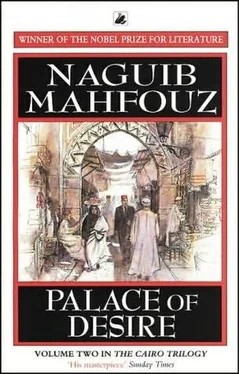Naguib Mahfouz - Palace of Desire
Здесь есть возможность читать онлайн «Naguib Mahfouz - Palace of Desire» весь текст электронной книги совершенно бесплатно (целиком полную версию без сокращений). В некоторых случаях можно слушать аудио, скачать через торрент в формате fb2 и присутствует краткое содержание. Жанр: Современная проза, на английском языке. Описание произведения, (предисловие) а так же отзывы посетителей доступны на портале библиотеки ЛибКат.
- Название:Palace of Desire
- Автор:
- Жанр:
- Год:неизвестен
- ISBN:нет данных
- Рейтинг книги:5 / 5. Голосов: 1
-
Избранное:Добавить в избранное
- Отзывы:
-
Ваша оценка:
- 100
- 1
- 2
- 3
- 4
- 5
Palace of Desire: краткое содержание, описание и аннотация
Предлагаем к чтению аннотацию, описание, краткое содержание или предисловие (зависит от того, что написал сам автор книги «Palace of Desire»). Если вы не нашли необходимую информацию о книге — напишите в комментариях, мы постараемся отыскать её.
, his rebellious children struggle to move beyond his domination, as the world around them opens to the currents of modernity and political and domestic turmoil brought by the 1920s.
Palace of Desire — читать онлайн бесплатно полную книгу (весь текст) целиком
Ниже представлен текст книги, разбитый по страницам. Система сохранения места последней прочитанной страницы, позволяет с удобством читать онлайн бесплатно книгу «Palace of Desire», без необходимости каждый раз заново искать на чём Вы остановились. Поставьте закладку, и сможете в любой момент перейти на страницу, на которой закончили чтение.
Интервал:
Закладка:
When he emerged from his daze, his eyes clearly showed his confusion. She smiled and asked, "Do you want to say something?"
Did lie want to say something? He did not know what he wanted. He really did not understand what he wanted. He inquired in turn, "Did you see that in my eyes?"
With a mysterious smile on her lips she replied, "Yes."
"Whst was it you saw in them?"
She raised her eyebrows in mock astonishment and said, "That's what I want to know."
Should he reveal his closely held secret and tell her straightforwardly, "I love you," without regard to the consequences? But why divulge it? What would become of him if, as was most likely, this confession ended the friendship and affection between them forever? As He pondered this question, he noticed a daring, self-satisfied, and supremely confident look in her eyes. Free of embarrassment or confusion, this glance seemed to fall on him from above, even though their eyes were at the same level. That made him uncomfortable and even more hesitant. He wondered what lay behind it. So far as he could see it was inspired by a feeling of disdain or perhaps by a sense of sport — as though she were an adult looking at a child. There was also evidence of a feeling of superiority that could not be justified merely by the difference in age between them, for she was only two years older at the most. The towering mansion on Palaces Street might look down on the old house on Palace Walk in just this way. But why had he not glimpsed it in her eyes before? She had never been alone with him. This was the first time he had had an opportunity to look at her closely. These ideas hurt and saddened him, causing his intoxication to fade away.
Budur held her hands out to him asking to be picked up, and so he lifted her in his arms. Then A'fda said, "How amazing! Why does my little sister love you so much?"
Looking at her eyes, he answered, "Because I harbor the same amount of love for her, or even more."
A'ida asked skeptically, "Is that a law?"
"The proverb says, 'Hearts communicate directly with each other.'"
She rapped on the table as she inquired, "Suppose a beautiful girl is loved by many men — should she love all of them? What sense would your law make in this case?"
This enchanting discussion made him oblivious to everything including his troubles. He replied, "She should then love the one who loves her most sincerely."
"How can she pick him out from the others?"
"If only this conversation could last forever," he wished.
"I refer you once more to the proverb: 'Hearts communicate directly with each other.'"
Her brief laugh sounded like a string being plucked. She remarked defiantly, "If this were true, no sincere lover would ever be disappointed in love. Is that correct?"
Her statement shocked him, as though reality was catching up with a man who relied on logic alone. If his reasoning was right, he would have been the happiest person alive with his love and his beloved. But was he anywhere near that blissful state? The long history of his love had embraced some moments of deceptive hope. These had illuminated the dark corners of his heart with an imaginary happiness after a sweet smile granted by the beloved, a passing remark open to wishful interpretation, or a cheerful dream concluding a night of pensive insomnia. His fantasies had drawn strength from maximshe revered, like: "Hearts communicate directly with each other". Thus he had been able to cling to his false hope with all the determination of a desperate person, until reality brought him back to his senses with this sarcastic and definitive statement like bitter medicine. With it, he could cure his future of lying hopes and learn exactly where he stood.
When he offered no response to the question with which she had challenged him, his beloved tormentor cried out victoriously, "I win!"
Silence reigned once more. Again he heard the rustling of the branches, the whispering of the dry leaves, and the chirping of the sparrows, but this time they encountered the tepid response of a disappointed heart. He noticed that her eyes were scrutinizing him more keenly than necessary and that her glance was increasingly daring and self-confident, as though she were toying with him. She looked like anything but a woman engrossed in a romantic conversation. He felt a cold, gnawing sensation in his heart. He wondered whether he had been destined to be alone with her like this so h is dreams could be demolished in one blow.
She r oticed his anxiety and laughed carelessly. Pointing to his head, she teased him: "You don't seem to have started to let your hair grow out."
He said tersely, "No."
"That doesn't appeal to you?"
Grimacing scornfully, he answered, "No."
"We told you it would look better."
"Does a man have to look handsome?"
Astonished, she replied, "Everyone likes people to look nice, whether they're men or women."
He felt tempted to repeat one of the phraseshe had memorized, like: "The beauty of men is in their deeds," but realized that a statement of this kind coming from a person resembling him would only meet with sarcastic mockery from his beloved. He attempted to conceal hisheart's pain with a forced laugh and said, "I don't agree with you."
"Or perhaps you flee from beauty the way you flee from beer and ham."
He laughed to relieve his despair and grief Then she continued: "Hair is a natural covering. I believe your head needs it. Don't you realize that your head is very large?"
"The two-headed boy!' Have you forgotten that old taunt?" he asked himself. "What misery!"
"Yes, it is."
"Why?"
Shaking his head disapprovingly, he answered, "Ask it yourself. I don't know."
She laughed faintly, and they were silent.
"Your beloved is beautiful, fascinating, and captivating but as is appropriate also all-powerful. Taste her power and discover the different varieties of pain."
She gave no sign of having mercy on him. Her beautiful eyes kept climbing up his face steadily until they fixed on… yes, his nose. Deep inside he felt a convulsion that caused his hair to stand on end and his eyes to look down. He waited fearfully. He heard her laugh and looked up to ask, "What's so funny?"
"I remembered some hilarious things I came across in a famous French slay. Haven't you read Cyrano de Bergerac?"
"The best time to scorn pain is when it's boundless," he advised himself Calmly and disdainfully he said, "There's no need to be polite. I know my nose is bigger than my head. But I beg you not to ask me why again. Ask it yourself, if you want."
Then Budur suddenly stretched out her hand and grabbed his nose. Aida burst into laughter. She leaned her head back. He too could not help but laugh. To hide his confusion he asked the little girl, "And you, Budur does my nose terrify you?"
They heard Husayn's voice as he came down the steps from the porch. Aida suddenly changed her tone. She warned him entreatingly, "Don't be angry at my little joke."
Husayn returned to the gazebo and sat down again in his chair, inviting Kamal to be seated. After some hesitation Kamal, placing Budur on his lap, followed his friend's example. But Aida did not stay long. She took Budur and bade them farewell. As she departed she gave Kamal a significant look, as though to stress her warning not to get angry. Kamal felt little appetite for resuming his conversation with Husayn and confined himself to listening or pretending to listen. From time to time he volunteered a question or an exclamation of surprise, appreciation, or disparagement, simply to show that he was present. Luckily for Kamal, Husayn harked back to a familiar topic requiring little concentration: his desire to go to France and his father's opposition, which he hoped to overcome shortly.
Kamal's heart and mind were preoccupied with the new look Aida had displayed in the minutes they were alone or almost alone together. Her visage had been disdainful, sarcastic, and harsh. How cruel she had seemed! She had toyed with him mercilessly. Like a cartoonist confronting the human form with his brush, she had focused her jests on him to produce a caricature extraordinary for both its ugliness and its accuracy. In a daze, he recalled her appearance. Although pain flowed like poison through his spirit, spreading a dark stain of dejection and despair, he felt no resentment, anger, or contempt. Was this not a new attribute of hers? Certainly! Like her infatuation with French or her taste for beer and ham, it was one of her essential characteristics, no matter how strange, and therefore worthy of her, although in someone else it would be considered a flaw, an indulgence, or a sin. It was no fault of hers if one of her attributes produced pain in his heart or despair in his soul. The guilt was his, not hers. Was she responsible for giving him an enormoushead or a huge nose? In her jests had she deviated from the truth and the reality? She had not and therefore was blameless. He deserved to suffer. It was his duty to accept this with ascetic resignation, like a devotee who believes implicitly in the fairness of a divine decree, no matter how harsh it appears, because the decree has been issued by the perfect beloved whose attributes and acts are beyond suspicion.
Читать дальшеИнтервал:
Закладка:
Похожие книги на «Palace of Desire»
Представляем Вашему вниманию похожие книги на «Palace of Desire» списком для выбора. Мы отобрали схожую по названию и смыслу литературу в надежде предоставить читателям больше вариантов отыскать новые, интересные, ещё непрочитанные произведения.
Обсуждение, отзывы о книге «Palace of Desire» и просто собственные мнения читателей. Оставьте ваши комментарии, напишите, что Вы думаете о произведении, его смысле или главных героях. Укажите что конкретно понравилось, а что нет, и почему Вы так считаете.












